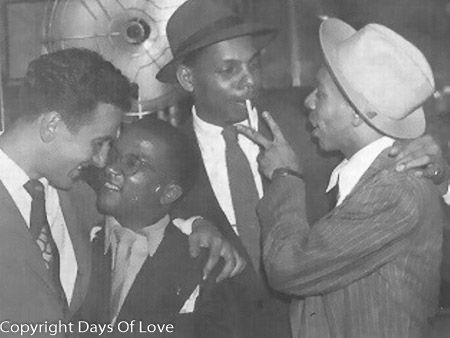Partner Aaron Bridges, Bill
Grove
Queer Places:
7212 Tioga St, Pittsburgh, PA 15208
Westinghouse High School, 1101 N Murtland St, Pittsburgh, PA 15208, Stati Uniti
315 Convent Ave, New York, NY 10031, Stati Uniti
79th Street Boat Basin, W 79th St, New York, NY 10024, Stati Uniti
 William Thomas "Billy" Strayhorn (November 29, 1915 – May 31, 1967) was an
American jazz composer, pianist, lyricist, and arranger, best known for his
successful collaboration with bandleader and composer
Duke Ellington, lasting
nearly three decades. His compositions include "Take the 'A' Train", "Chelsea
Bridge", "A Flower Is a Lovesome Thing", and "Lush Life".
William Thomas "Billy" Strayhorn (November 29, 1915 – May 31, 1967) was an
American jazz composer, pianist, lyricist, and arranger, best known for his
successful collaboration with bandleader and composer
Duke Ellington, lasting
nearly three decades. His compositions include "Take the 'A' Train", "Chelsea
Bridge", "A Flower Is a Lovesome Thing", and "Lush Life".
Shortly before going on his second European tour with his orchestra, from
March to May 1939, Ellington announced to his sister Ruth and son Mercer
Ellington that Strayhorn "is staying with us."[11]
Through Mercer, Strayhorn met his first partner, African-American musician
Aaron Bridgers,
with whom Strayhorn lived until Bridgers moved to Paris in 1947.[12]
Strayhorn was openly gay.[6]
He participated in many civil rights causes. As a committed friend to Dr.
Martin Luther King, Jr., he arranged and conducted "King Fit the Battle of
Alabama'" for the Ellington Orchestra in 1963 for the historical revue (and
album) My People, dedicated to King.
Strayhorn's strong character left an impression on many people who met him.
He had a major influence on the career of Lena Horne, who wanted to marry
Strayhorn and considered him to have been the love of her life.[13]
Strayhorn used his classical background to improve Horne's singing technique.
They eventually recorded songs together. In the 1950s, Strayhorn left his
musical partner Duke Ellington for a few years to pursue a solo career of his
own. He came out with a few solo albums and revues for the Copasetics (a New
York show-business society), and took on theater productions with his friend
Luther Henderson.
Billy had one last partner at this time, Bill Grove, a graphic designer who had been in Strayhorn’s extended circle for years, but who became a strong comfort and supporter in the final years of his life. A pianist named Dwike Mitchell, a friend of Grove’s,
said that Grove “is the only person — and I say person, not white person — who I’ve ever met in my life who didn’t have an ounce of prejudice in him.” They never moved in together, but to the end they were nearly always together.
Strayhorn was diagnosed with esophageal cancer in 1964, which eventually
caused his death in 1967. Strayhorn finally succumbed in the early morning on
May 31, 1967, in the company of his partner, Bill Grove, not in Lena Horne's
arms as has often been falsely reported. By her own account, she was touring
in Europe when she received the news of Strayhorn's death.[14]
His ashes were scattered in the Hudson River by a gathering of his closest
friends.[15]
While in the hospital, he had submitted his final composition to Ellington.
"Blood Count" was used as the third track to Ellington's memorial album for
Strayhorn, …And His Mother Called Him Bill, which was recorded several
months after Strayhorn's death. The last track of the album is a spontaneous
solo version of "Lotus Blossom" performed by Ellington, who sat at the piano
and played for his friend while the band (who can be heard in the background)
packed up after the formal end of the recording session.
My published books:


BACK TO HOME PAGE

- https://en.wikipedia.org/wiki/Billy_Strayhorn#Notes
 William Thomas "Billy" Strayhorn (November 29, 1915 – May 31, 1967) was an
American jazz composer, pianist, lyricist, and arranger, best known for his
successful collaboration with bandleader and composer
Duke Ellington, lasting
nearly three decades. His compositions include "Take the 'A' Train", "Chelsea
Bridge", "A Flower Is a Lovesome Thing", and "Lush Life".
William Thomas "Billy" Strayhorn (November 29, 1915 – May 31, 1967) was an
American jazz composer, pianist, lyricist, and arranger, best known for his
successful collaboration with bandleader and composer
Duke Ellington, lasting
nearly three decades. His compositions include "Take the 'A' Train", "Chelsea
Bridge", "A Flower Is a Lovesome Thing", and "Lush Life".
